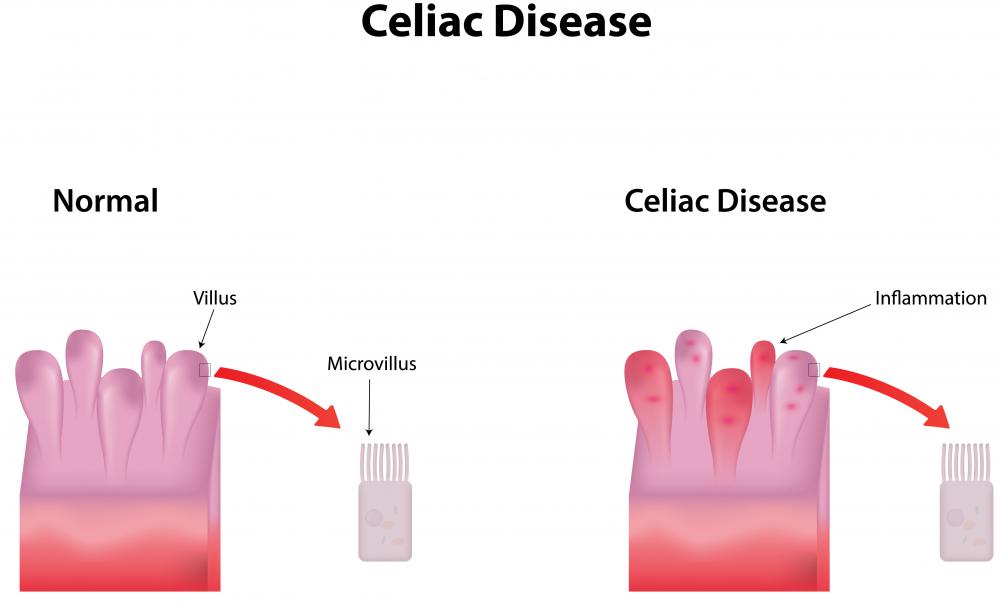At WiseGEEK, we're committed to delivering accurate, trustworthy information. Our expert-authored content is rigorously fact-checked and sourced from credible authorities. Discover how we uphold the highest standards in providing you with reliable knowledge.
What is Abdominal Bloating?
Abdominal bloating occurs when a person‘s abdomen feels overly full and tight. In such a case,the affected person's abdominal area may seem swollen, and his clothes may feel tighter than usual. Often, this bloating is caused by such issues as gas, constipation, lactose intolerance, indigestion, or overeating. Sometimes, however, bloating may have more troubling causes, such as tumors or dumping syndrome, which is a condition in which food moves to a person’s small intestine faster than normal.
In most cases, abdominal bloating isn’t a sign of anything serious. Instead, it usually occurs when a person has overeaten or consumed gassy food. Sometimes it develops because of lactose intolerance or in relation to a woman’s menstrual period. In fact, an individual may even develop temporary bloating if he swallows a lot of air, which may occur if he talks a good deal during meals or chews gum.

Sometimes a person may have bloating because he is constipated. Bloating may also occur when a person has a condition such as gastroesophageal reflux or irritable bowel syndrome. A person may also deal with bloating after consuming food or drinks that are irritating to his digestive tract. Weight gain may cause it as well.
While bloating is usually not a sign of a worrisome condition, it may sometimes develop in relation to a serious disorder. For example, a person may experience bloating when he has liver disease or a benign or malignant tumor. Sometimes a person with celiac disease will experience it as well. Celiac disease is a condition in which a person’s intestinal lining fails to absorb certain nutrients that are necessary for good health.

Often, the best treatment for abdominal bloating is prevention. A person who wants to prevent bloating may avoid foods that contribute to gas, such as soda, cabbage, and beans. He may also do well to avoid eating too fast, smoking, chewing gum, or talking a lot during meals. Additionally, there are some over-the-counter medications and home remedies that are said to help relieve or prevent the accumulation of abdominal gas, but they may not always work.

Though abdominal bloating is often harmless, there are times when it may be an indication that something is seriously wrong. An individual may do well to seek a doctor's advice for bloating that seems persistent and is accompanied by pain, diarrhea, or bloody stools. Weight loss and worsening heartburn are also signs that a doctor's advice may be needed.
AS FEATURED ON:
AS FEATURED ON:















Discussion Comments
Does anyone know of any remedies for excessive abdominal bloating during menstruation? During my period, I get so bloated that I can't fit into my pants.
@MikeMason-- Yes, I have the same issue and I believe the cause is non-Celiac gluten sensitivity. It's difficult to diagnose gluten sensitivity because it's not always extreme and allergy tests may not pick up on it.
But if you regularly experience abdominal bloating symptoms, indigestion and fatigue after eating gluten, clearly you have a sensitivity to it.
Try to avoid gluten for a few weeks and see how you feel. If the bloating goes away, you may want to consider going gluten-free altogether.
I know that I don't have Celiac disease. I was tested for it once when both my sister and cousin were diagnosed with it. I tested negative.
But lately, I've been experiencing severe abdominal bloating after eating wheat products, particularly bread.
Has anyone else experienced this?
Post your comments